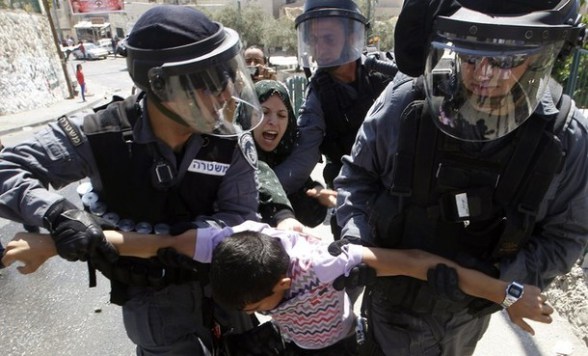Analysis of the song Right of Return
 I consider the song “Right of Return”, although not necessarily my most popular song with the audience in musical terms, to be one of my most important works. There are a number of reasons why I see it this way.
I consider the song “Right of Return”, although not necessarily my most popular song with the audience in musical terms, to be one of my most important works. There are a number of reasons why I see it this way.
First of all, according to my view, the Right of Return is the heart of the Palestinian cause. Without putting this inalienable right at the center of our struggle, where it belongs, the cause is inevitably corrupted by diverting it from its main essence. It is the Nakba and the indefensible founding of the illegal Zionist state that caused the injustice, and without rectifying this crime against humanity, no peace will ever be attained in the Middle East.
Secondly, this song addresses the unbreakable ties between the Palestinian people, wherever the diaspora may have scattered them, and their homeland. Although each of my political songs addresses some aspect of our struggle, this element of it must undoubtedly be seen as one of the most important ones.
 I originally wrote this song on acoustic guitar, already envisioning it to be turned into a richer arrangement with instruments that would take it into the genre of jazz. This was not a deliberate choice, but simply the way I felt and heard the song in my heart and mind. When I write a song, I often have a quite defined idea of how I want it to sound when it is finished. It is always a challenge for me to get it to end up sounding as close as possible to what I have envisaged, although most of the time I feel that I do not entirely succeed at that. In the case of ‘Right of Return’, I believe I came quite close.
I originally wrote this song on acoustic guitar, already envisioning it to be turned into a richer arrangement with instruments that would take it into the genre of jazz. This was not a deliberate choice, but simply the way I felt and heard the song in my heart and mind. When I write a song, I often have a quite defined idea of how I want it to sound when it is finished. It is always a challenge for me to get it to end up sounding as close as possible to what I have envisaged, although most of the time I feel that I do not entirely succeed at that. In the case of ‘Right of Return’, I believe I came quite close.
If you click on this link, you can read the lyrics in their entirety before we enter into the analysis. You can also listen to the song by clicking on the play button in the player below. In the following, I will highlight the meanings of the words. It may help you discover meanings and references that were not immediately obvious to you, especially if you are not so well-informed about the issue. Let’s get started!
The song opens with:
You are like the olive tree
Just like you were meant to be
Though your roots dig deep into the land
They were uprooted by a savage hand
This first verse compares the Palestinian to an olive tree. The olive tree is of invaluable symbolism to the land of Palestine and its people. Besides the cultural (olive picking season), economical, and historical importance of these trees for the Palestinians, the tree is also a symbol of resilience , survival, longevity (olive trees sometimes live for thousands of years), productivity and fruitfulness. The verse compares the Palestinian to the tree, and adds that he/she is just like they were meant to be, emphasizing that the natural state of the children of Palestine is in full harmony with their destiny.
, survival, longevity (olive trees sometimes live for thousands of years), productivity and fruitfulness. The verse compares the Palestinian to the tree, and adds that he/she is just like they were meant to be, emphasizing that the natural state of the children of Palestine is in full harmony with their destiny.
The third sentence symbolizes how deep the connection of the Palestinians is to the land, comparing it to the roots of the olive tree. The fourth and last phrase clearly refers to the brutal and inhumane Nakba (forceful expulsion of over 800,000 Palestinians in 1948) that was savagely perpetrated by the Zionists.
But the ties were forged through centuries
A bond so strong and fixed in history
You are the land and the land is you
A solid unity they never can undo
The second verse starts with ‘but’, making it clear that despite this forced exile, the ties remain intact. As it goes on, the historical connection is again repeated and emphasized. ‘You are the land, and the land is you’ makes the Palestinians an inseparable part of the Palestinian landscape and habitat. It’s a ‘solid unity’, and there is no violent Nakba that can undo this connection.
Cherish your leaves, let your branches bear your fruits
All you need to do is protect and feed your roots
Since this song mainly addresses the younger generation, these phrases are urging them to be proud of who they are, and to always aim at being productive and successful. It also tells this generation to protect its (cultural and historical) roots, and to feed them. Of course, when talking about a tree, feeding roots is what makes leaves healthy, and produces fruits, but translated back into the human meaning it also means that these younger generations of Palestinians should make an effort to keep their cultural heritage and identity alive.
The old will die, but the young will learn
The road is long and it will twist and turn
But when you know your destiny
You know where you need to be
And we always will believe
It’s our Right to Return
 The first phrase is a reference to the infamous quote from Ben Gurion, when he referred to the fate of the Palestinians whom the Zionists expelled from their homeland Palestine: “The old will die, and the young will forget”. This song aims to make a strong statement against that claim, which is why both chorus verses of the song start with it. Of course, the old will die, but the young will learn: they will learn about the history of the injustice, about their rightful heritage, and about their inalienable rights. It stresses the importance of education, a philosophy strongly upheld by generations of Palestinians who have been clinging to academic excellence in order to empower themselves in the absence of a sovereign homeland.
The first phrase is a reference to the infamous quote from Ben Gurion, when he referred to the fate of the Palestinians whom the Zionists expelled from their homeland Palestine: “The old will die, and the young will forget”. This song aims to make a strong statement against that claim, which is why both chorus verses of the song start with it. Of course, the old will die, but the young will learn: they will learn about the history of the injustice, about their rightful heritage, and about their inalienable rights. It stresses the importance of education, a philosophy strongly upheld by generations of Palestinians who have been clinging to academic excellence in order to empower themselves in the absence of a sovereign homeland.
The rest of the chorus speaks for itself; it is obvious that the road back home will be long, and far from easy, but the determination and the conviction of the younger generation will not be lessened by it.
Black on white they wrote that vow
But to act on it was not allowed
Empty words like a carrot on a stick
Ink is fading as the clock goes on to tick
This verse refers to UN resolution 194. It was written black on white, as a vow by the nations of the world that the Palestinians have a right to return to their homeland. The second phrase refers to the fact that although resolution 194 is confirmed every year, any action in the direction of its realization is strongly tampered with and opposed. The result is that UN 194 functions as a carrot on a stick, a promise that is reiterated but never fulfilled by the powers that be. As time goes on, the ink it was written in is starting to fade.
Dispossession and racial oppression
Every psycho form of Zionist aggression
Was condoned by that very same force
Though they say our rights are still endorsed
Despite the fact that UN resolution stresses the legitimacy of the most essential issue of the Palestinian cause, that same body of international cooperation condones Zionist aggression in all of its forms, both the ethnic cleansing and dispossession, and the Apartheid-like oppression that ‘Israel’ practices. As the last phrase of the verse says, although in words all these acts of aggression by the Zionist state are denounced, and the rights of the Palestinians remain endorsed, the unwillingness of the UN to convert these principles into action functions as a ‘carte blanche’ for the heinous policies of Zionist ethnic supremacy.
We don’t need your words, they’re just empty talk
Why don’t you just keep on talking while we walk the walk
The bridge leading to the chorus refers to this inaction again as ’empty talk’, with its second phrase promising that the Palestinians will not abide by this apathy, but will take matters into their own hands.
The old have died, but the young are strong
We know who we are and where we belong
With the key in our hand
We’ll come home to our land
We know we will always stand
for our Right of Return
 In the last verse of the song, which resembles the first chorus, the fact that the older generation has largely passed away is confirmed. However, defying the fallacious prophecies of Ben Gurion, the strength and determination of the younger generation is again underlined. The key is a powerful symbol of the Right of Return; most refugee families still hold on to the front door keys of the homes their parents or grandparents were expelled from, as a solemn promise that they will one day come home and open the doors.
In the last verse of the song, which resembles the first chorus, the fact that the older generation has largely passed away is confirmed. However, defying the fallacious prophecies of Ben Gurion, the strength and determination of the younger generation is again underlined. The key is a powerful symbol of the Right of Return; most refugee families still hold on to the front door keys of the homes their parents or grandparents were expelled from, as a solemn promise that they will one day come home and open the doors.
Perhaps all of these lyrics were already obvious to you; perhaps the explanations have provided a deeper insight into the meanings of these words. It all depends on how well-informed you are about Palestinian culture, symbolism and history. Nonetheless, I hope you have enjoyed this song analysis, and that it has made it clear to you why I cherish this song as one of my favorite and most important musical and poetic expressions. Perhaps it also has made you more curious about my other songs. Similar symbolism is very prevalent in my songs, and perhaps if you hear some of my other lyrics after having read this, you will discover deeper meanings where you never suspected them.
Until Liberation and Return!




Recent Comments